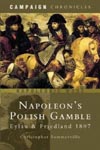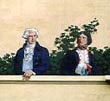| |
| |
EDITORIAL
This week we are commemorating the bicentenary of the death of Pascal/Pasquale Paoli (d. 5 February, 1807), Corsican patriot and statesman who profoundly marked not only the history of the island but also the youth of Napoleon Bonaparte. For this reason we have prepared a special dossier.
This week is also the bicentenary commemoration of the battle of Eylau. Many will perhaps be going to Preussisch-Eylau (Bagrationvsk) to remember the tens of thousands of French, Russians and Prussians who died in that inconclusive bloodbath. This month's book tells the story of that Polish gamble. We will be bringing you our own commemoration of the battle next week.
On a less tragic note, we also bring you the 150th anniversary of the trial of Gustave Flaubert and the court case brought against him for "insulting public morals and offending decent manners" by the serialised publication of the novel Mme Bovary.
Enjoy your read
Emmanuelle Papot tr. P.H.

|
|
|
| |
THIS MONTH'S BOOK
SUMMERVILLE C. J., Napoleon's Polish Gamble: Eylau and Friedland 1807
Written in a racy, journalistic style, this chronicle of the Prussian and Polish campaigns of 1806 is informative and very readable. Always very "military history" in style, it depends heavily on memoir accounts, giving a very appealing 'eye-witness' quality to the writing.
© Barnsley: Pen & Sword Books

|
|
|
| |
BICENTENARY DOSSIER: PASCAL/PASQUALE PAOLI (1725-1807)
«The memory of Paoli is sacred for Corsicans. When they hear talk of Napoleon, their hearts fill with pride. But at the name of Paoli, their eyes light up, like those of a son in memory of his noble but departed father.» (Gregorovius).
A short biography
On the net
Article:
Napoleon and the Corsican Dilemma - parts 1 and 2, by Barbara Krajewska
Bibliography:
- James Boswell, Journal of a Tour to Corsica and Memoirs of Pascal Paoli (1768)
re-published by Turtle Point Press, 2002
- Peter A. Thrasher, Pasquale Paoli: An Enlightened Hero 1725-1807, London Constable 1970
- Moray McLaren, Corsica, Boswell, Paoli, Johnson and Freedom, London, Secker & Warburg, 1966
- Joseph Foladare, Boswell's Paoli, Transactions of the Connecticut Academy of Arts and Sciences 48 (Hamden Conn., 1979)
These titles can be found with others online here on the site
Itinerary:
Napoleon and Corsica

|
|
|
| |
200 YEARS AGO
The Polish campaign continues:
On 3 February, 1807, at the Battle of Olsztyn (Allenstein) or Inkowo, Napoleon engaged Benningsen, but since the battle was begun too late the result was inconclusive and Benningsen managed to get his troops away. On 5 February Ney was sent to meet Lestocq and his Prussian troops to prevent him from linking up with Benningsen. Lestocq however left his wounded and rearguard at Waltersdorf to hold Ney off. The rearguard was duly captured along with much artillery, but they had resisted long enough to give Lestocq time escape with 7 to 8,000 men.
On 8 February, 1807, took place the appalling (and inconclusive) bloodbath at Eylau, pitching French against Prussian and Russian forces. Despite the fact that both sides lost tens of thousands of men, Eylau is usually recorded as a French victory since the Russians retreated after the confrontation leaving the French in control of the battlefield. Napoleon noted in a letter to General Duroc, on 9 February, 1807: «There was a particularly bloody battle yesterday at Preussich-Eylau. The battlefield was ours in the end, but the fact is both sides lost many men and the distance makes my losses all the more crucial. Corbineau was taken by a cannonball; Marshal Augereau was lightly wounded; d'Hautpoul, Heudelet, and four or five other generals were wounded.» (Correspondance n°11789)
Don't miss next week's Bicentenary Dossier.
5 February, 1807, death in London of Pascal Paoli, the great Corsican patriot and fierce defender of Corsican independence. He was buried, as he wished, in St Pancras Cemetery, London. In 1889, his mortal remains were exhumed and buried in the Paoli family chapel in his native town of Morosaglia. The chapel subsequently became the Musée Départemental Pasquale Paoli.
150 YEARS AGO
Literature:
In February 1857, the British author Charles Dickens (famous for his works such as Oliver Twist and David Copperfield) published his complete works for the first time translated into French by the publishing house Hachette.
«The present publication […] has been executed with the greatest care, and the many difficulties which it posed have been surmounted with rare skill, intelligence and perseverance. [...] I am proud to be presented to the great French people, whom I love and sincerely respect, a people whose favourable judgement and good opinion should be sought by all those who cultivate letters […]. This translation of my works is the only one I sanction.» (Charles Dickens, London, 17 January, 1857, in Le moniteur universel dated 7 February, 1857).
7 February, 1857, saw the end of the trial involving the writer Gustave Flaubert, the owner and the printer of La Revue de Paris. The three men had been accused of insulting public morals and offending decent manners by the serialised publication of the novel Mme Bovary. They were however to be acquitted. The public prosecutor had criticised the lascivious nature of the character Mme Bovary and the suggestive descriptions. The trial is however a good example of the way in which spectre of the censor hung over the press during the Second Empire.
On the prosecutor's speech
On censorship in the nineteenth-century novel
See also the online article by Christine Haynes, The politics of publishing during the Second Empire: the trial of Madame Bovary revisited.
Wishing you an excellent, Napoleonic, week.
Peter Hicks
Historian and Web editor
THE NAPOLEON.ORG BULLETIN, No 401, 2 - 8 February, 2007
Interested in the work of the Fondation Napoléon? Why not participate, either generally or in a specific project, by making a donation.
© this Napoleon.org weekly bulletin is published by the Fondation Napoléon. Reproduction or all or part of this bulletin is forbidden, without prior agreement of the Fondation Napoléon.

|
|
|
|
|
|
|
|
|
|
|
|
THIS WEEK in the MAGAZINE
WHAT'S ON
Conferences:
- Napoleon at the Zenith: a bi-centennial seminar, Liverpool, UK
Exhibitions:
- Napoleon, Trikolore und Kaiseradler über Rhein und Weser, Wesel and Minden, Germany
- NAPOLÉON An Intimate Portrait, Oklahoma, USA
- Das Königreich Württemberg 1806–1918. Monarchie und Moderne (The kingdom of Württemberg 1806–1918. Monarchy and modernity), Stuttgart, Germany
- Champignon Bonaparte - illustrations by Gilles Bachelet, Paris, France
- "The trace of the eagle", the Invalides dome, Paris, France
Got a problem with the letter? Try the home page: http://www.napoleon.org
<<
|
|



